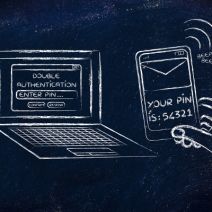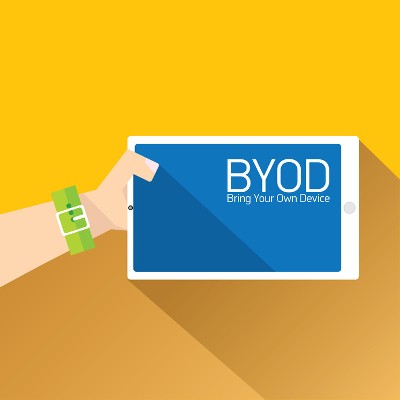Businesses are always trying to improve on efficiency, and one method they use to do so is mobile technology. Businesses invest in mobile technology like smartphones, laptops, and data plans for their employees with the expectation that it will help them be more productive, but the fact of the matter is that these investments are costly for the return. There is another approach businesses use: Bring Your Own Device, or BYOD, and it’s a great way to save capital while achieving the same levels of productivity from mobile technology.
PCSOFT Blog
Organizations are always trying to get more efficient. One way that businesses are able to accomplish this is by utilizing mobile computing. This used to mean that businesses would have to spend a bunch of money purchasing phones, data plans, and the like for their employees. Some time ago, businesses started to realize that they could improve their mobile strategies without this massive expense by enacting a BYOD policy. Let’s discuss what a BYOD policy is and how it does more than just save a business money.
Think how much has changed in the past 20 years. The Internet went from dial-up to broadband. Cellular networks have brought computing to more people through the use of computers that fit in your pocket. These mobile devices have changed the way that we communicate, changed the way business works, and changed the way we go about our daily lives. Let’s talk about how mobile is the predominant type of computing being used in society today.
Network security is not the easiest thing to implement for your business, and you definitely need someone trained in this topic to be the one behind the wheel. Thankfully, the correct solutions can make this much easier to pull off. Here are some of the best and most important security solutions you should be considering for your organization.
While smartphones can help businesses quite a bit, they can also be quite detrimental to their success. If you can get past the issues related to employees bringing their own devices to the workplace, then you’ll be able to save a considerable amount of time and money doling out mobile devices. However, you will need to make sure you have a mobile device management policy put in place so that you can control how those mobile endpoints interact with your business’ standing infrastructure and data.
Productivity. Your company needs it. Your employees are measured largely by their ability to effectively turn their effort into a tangible product or service that creates revenue. In short, it means everything to your business. Why then, if it is so necessary, is it so hard to get the people you depend on to realize just how important their productivity is to the success of the business? This month we will talk about what makes a business productive, and what technology will mitigate the major barriers to productivity.
Bring Your Own Device has a lot of benefits for businesses, chief among them being giving your users the opportunity to use their own devices for work rather than those provided to them. More often than not, they will benefit from easy-to-use apps on their preferred devices, allowing them to get more done throughout the workday. When you implement BYOD, though, there are various concepts that you have to consider in order to ensure productivity, flexibility, security, and profitability.
Mobile devices are one of the greatest tools available for business use today. However, because society has come to rely so much on mobile devices, these devices have become a treasure trove for cybercriminals to obtain information from. For this week’s tip, we’ll go over some simple ways to protect yourself from such threats.
For the modern business, having a strategy to manage your employees smartphone use is essential. This is because most of the people that work for you have smartphones. One study shows that upwards of 90 percent of people under 30 own a smartphone. If you have any design on running a business, or employing millennials (who are the largest generation in the current workforce), you’ll need to know what you are doing to protect your business from the increasing amount of threats that are out there targeting smartphones.
Google’s Android line of smart devices have made their presence well-known in the business world. Google now offers a zero-touch enterprise solution for its Pixel-line mobile devices. The primary reason for this is that mobile devices are somewhat time-consuming to set up, especially on the business level. You can save time by pre-configuring these devices for your business to use using Pixel’s zero-touch solution.
While mobile devices like smartphones and laptops have allowed modern employees to keep up with their workload and improve flexibility, they are also a significant threat to your organization’s data. Therefore, you need to consider how these mobile devices will affect your business’s IT strategy. Even if you haven’t, it’s likely that someone in your organization has considered it.
Gartner conducted a large survey last year that came to the following conclusions:
- 8 out of 10 employees use personal devices with them to the office.
- 37 percent of employees are given laptops by the employer.
- 23 percent of employees surveyed are given company-provided smartphones, but only 10 percent of them don’t use their own personal device.
- Only 20 percent of employees given a work device were unsatisfied with it. The satisfaction rate is usually higher among those who are given smartphones, compared to those who are given desktops or laptops.
- Over half of all employees who use their smartphones for work use their own personal device.
- Two-thirds of employees use a personal device for work, including a smartphone, tablet, or laptop.
While your business may have gone the extra mile to protect its data, as well as access to internal files and email, personal devices add a new level of complexity to your strategy.
What Are Some of the Risks?
If you let mobile devices onto your company network haphazardly, there will be plenty of risks associated with them. This is why mobile devices are such a controversy in the first place, and why employers go to such lengths to control their use in the workplace.
Lost devices could potentially give strangers, or even thieves, access to your company’s email, which can include anything from sensitive client information to sensitive information like passwords or usernames. Furthermore, if a personal laptop gets hacked or infected by malware (or worse), the infection could spread to your network. Even something as simple as a public Wi-Fi connection could put your business’s data or passwords at risk.
Now, consider what happens when an employee leaves your organization. If they are using a personal device for work-related tasks, they could have contact lists, files, or other information that you don’t want them to have anymore--especially if they leave on bad terms. The resulting fallout could have you in damage control mode for far too long to make mobile devices worth it.
Let Us Help with BYOD
With a Bring Your Own Device policy, your organization will be prepared to properly leverage employee-owned personal devices. If you want to use devices without placing your data at risk, a well-rounded plan that covers all your concerns is the best way to do this. To learn more about BYOD and how you can keep your sensitive data safe, even on mobile devices owned by your employees, reach out to PCSOFT at 02 98730080.
Having mobile devices in the workplace can be tricky. While these devices greatly enhance flexibility, at the same time, mobile devices can leave your network unsecure if the proper precautions aren’t taken. To help you better manage the mobile devices connecting to your network, be sure to take advantage of these three mobile features.
Remote Wiping
One major drawback of mobile devices is how they can all too easily become lost or stolen. Obviously, if this were to happen to a device with sensitive company information stored on it, then you’d have good reason to panic. However, if the misplaced device was equipped with a cloud-based, remote wiping feature, you could then take action and wipe the device of its critical information before it’s too late.
Whitelisting and Blacklisting Applications
There are many malicious mobile apps out there that can deal great harm to your business. The risk can range from an app siphoning sensitive information to hackers, to having a device become compromised and enlisted in a mobile botnet. Security problems like these can be easily prevented if these apps are blocked from installing on the mobile device in the first place. This is achieved with a mobile device management solution that’s equipped to allow a network administrator the ability to whitelist and blacklist applications. As a bonus, this feature allows apps to be blocked on company devices that hinder productivity.
Actually, when it comes to mobile devices accessing corporate information, it’s a best practice to not allow users to download apps without first clearing the app with IT. When it comes to malicious apps, they’re designed to look like the real deal and have been known to fool even experienced users. Subsequently, when an IT professional oversees the installation of mobile apps, they’re able to adequately test the app for any security risks and then clear it for passage.
Cloud Syncing
For any business utilizing mobile devices, cloud syncing is the glue that holds every mobile strategy together. Without this feature, different versions of the same file would exist across multiple devices and manually syncing these files would be more work than what it’s worth. With cloud syncing, every edit to every version of every file is automatically saved and synced in the cloud. This allows your staff to collaborate in real-time using all of their various devices. Therefore, if you’re thinking about adopting mobile technology for your business, you’ll want to select cloud offerings that provide your business with the flexibility you need to succeed.
Implementing a mobile strategy that includes these three features is a great way to get started with mobile devices in your workplace. Of course, there are more factors to consider, like how mobile devices affect overall network security, and what it looks like for employees to use their personal devices for work purposes. To get started with a mobile device management solution that will best serve your needs, give us a call today at 02 98730080.
Bring Your Own Device, or BYOD, continues to grow into one of the most accepted practices within an organization. Yet, one major problem has always plagued BYOD in the form of security. Thankfully, with the help of mobile device management, businesses are able to minimize this risk while leveraging the benefits that BYOD offers.
 Mobile devices are important components of any modern workplace environment, and this trend is only growing more popular with time. Workers love the opportunity to use their own devices, like laptops or smartphones, and doing so is a trend known as Bring Your Own Device (BYOD). While this is a huge benefit for businesses that have trouble procuring equipment, it also presents several risks, many of which are associated with the Internet of Things (IoT).
Mobile devices are important components of any modern workplace environment, and this trend is only growing more popular with time. Workers love the opportunity to use their own devices, like laptops or smartphones, and doing so is a trend known as Bring Your Own Device (BYOD). While this is a huge benefit for businesses that have trouble procuring equipment, it also presents several risks, many of which are associated with the Internet of Things (IoT).
As reported by Tech Pro Research, 59 percent of businesses currently allow the use of personal devices in the workplace. Only 28 percent of businesses refuse to let their workers use their personal devices for work purposes, and only 13 percent of business owners are planning to make the change to BYOD over the next year.
It’s safe to say that this trend has caught plenty of traction, and that it’s likely to continue growing in the next few years. However, the number of businesses that aren’t willing to embrace BYOD do have a solid reason for not doing so. BYOD needs to be regulated on a corporate level if it’s going to be allowed, and the Internet of Things doesn’t help this endeavor. With so many new devices entering the market, it’s no surprise that your employees might pick up a few of these connected devices for themselves.
Even if businesses don’t want to embrace BYOD and the Internet of Things, they might not have a choice if workers bring their Internet-connected devices to the office with them anyway. In this case, it’s best to have a plan for managing the risks of the Internet of Things and BYOD, while also permitting workers to use their own devices.
Benefits of BYOD
Bring Your Own Device presents several unique benefits for the average SMB, many of which are capable of improving your business’s operations and bottom line.
- Lower your up-front hardware costs: Allowing employees to use their own devices saves your business from going through the trouble of providing them with tools needed for their jobs. If they already have the hardware necessary to handle their duties, why should you have to invest heavily in providing them with the same tech?
- Increase workforce mobility and satisfaction: Employees are bringing their laptops, smartphones, and other technology to the office for work purposes. This means that they can take this technology home with them, effectively allowing them to work remotely if need be. These employees can put in more hours and achieve greater productivity. Furthermore, they’ll be happier knowing that they have the choice of using their own devices. Allowing your team to work on their own terms can be empowering, and it can lead to greater workplace satisfaction.
- Decrease your reliance on IT for maintenance: At first, you might look at this statement and wonder how true it is, but we urge you to think of it this way; would you be more likely to take care of a device you own, or one that’s provided to you for the purpose of working with it? Your employees want to make sure that their devices stay updated and in tip-top shape, so it makes sense that they’ll take care of this maintenance themselves, rather than having to resort to your IT department handling it. Your IT department, if you have one, can instead spend time innovating and integrating new solutions that can save your business money or streamline operations.
Risks Presented by the IoT
Even with the major benefits of BYOD, there are a number of risks involved with implementing it, including the Internet of Things. Your business handles sensitive data on a daily basis, and having countless Internet-connected devices that communicate with each other near your data is a recipe for disaster. Devices included in the Internet of Things are smart building components, like thermostats and light fixtures, smart appliances, and even smart automobiles.
The main issue presented by the IoT is security. If any IoT devices that has access to your network were to become corrupted or infected by a virus, it could potentially spread to your entire data infrastructure. While this might be a worst-case scenario, and it’s not like you should have to worry too much about a Fitbit fitness tracker bringing down your company, it’s still imperative that you take into account everything that accesses your network, and know if it’s storing data and who’s controlling it when dealing with any and every mobile device in the office.
BYOD is helping businesses all over the world embrace a more mobile industry, and you can take advantage of it, too. PCSOFT can help your organization manage the risk associated with BYOD and the IoT by integrating mobile device management solutions, and by helping you prepare yourself for the inevitable arrival of the Internet of Things.
For more information, give us a call at 02 98730080.
 More often than not, it’s always recommended that you use a solid password to optimize your online accounts. However, just because passwords are critical, doesn’t mean that you should put all your eggs in one basket. Passwords should only be the start of a comprehensive online account security setup.
More often than not, it’s always recommended that you use a solid password to optimize your online accounts. However, just because passwords are critical, doesn’t mean that you should put all your eggs in one basket. Passwords should only be the start of a comprehensive online account security setup.
 With so many great mobile devices at your team’s disposal, it’d be a shame to not allow them to use their devices in the workplace. This trend, known as Bring Your Own Device (BYOD), has been taking the workplace by storm, and offers a great way to enhance productivity both in and out of the office. BYOD, while a great asset, should only be approached with caution, as the slightest oversight could expose sensitive information to the world.
With so many great mobile devices at your team’s disposal, it’d be a shame to not allow them to use their devices in the workplace. This trend, known as Bring Your Own Device (BYOD), has been taking the workplace by storm, and offers a great way to enhance productivity both in and out of the office. BYOD, while a great asset, should only be approached with caution, as the slightest oversight could expose sensitive information to the world.
 If your organization hasn’t already realized that mobile devices have changed the landscape of the business environment, take a look at each and every one of your workers. How many of them utilize a smartphone or mobile device for work purposes? How do businesses handle an influx of network activity from mobile devices? How do these devices access this information? These are all questions you should be prepared to ask when considering mobile devices in the workplace.
If your organization hasn’t already realized that mobile devices have changed the landscape of the business environment, take a look at each and every one of your workers. How many of them utilize a smartphone or mobile device for work purposes? How do businesses handle an influx of network activity from mobile devices? How do these devices access this information? These are all questions you should be prepared to ask when considering mobile devices in the workplace.
Bring Your Own Device (BYOD)
These days, it’s not a matter of allowing mobile devices in the workplace; it’s whether or not you want to allow your employees to access mission-critical apps and information through their mobile devices. Most businesses have employees who would rather use their own personal devices than those provided by the organization. This has proven to be an exceptional tool to promoting employee satisfaction and ensuring that technology is consistently working at maximum efficiency. After all, people are more likely to maintain technology if they own it.
Furthermore, if employees are more willing to use their mobile devices for work-related purposes, this means that you won’t have to commit to purchasing hardware and software required for them to do their job (if they already own it). Often times, it’s little details like these that can make a big difference in your IT budget, so it’s beneficial for your organization to take advantage of BYOD if possible.
Mobile Device Management
While there is a significant boon to allowing BYOD policies in your office, there’s also a significant risk involved. When an organization experiences an increase in mobile device traffic, it becomes a concern for your network’s security. If businesses are allowing employees to use their own device for accessing critical data, this could be putting sensitive information at risk. This is why it’s important to control mobile devices’ access to data through whitelisting and blacklisting functions provided by a mobile device management solution.
More than anything else, you need to be able to control an application’s access to data, as well as incorporate the ability to remotely wipe devices should they be stolen, lost, or compromised. There’s no telling what a hacker might do if they can get access to your organization’s network. Therefore, the ability to eliminate any data in one swift measure is invaluable, especially when it comes to data security compliance.
Cloud Services
Businesses are taking advantage of the cloud for both storing their organization's data, and deploying mission-critical applications. The cloud is an imperative way to help your employees access information they need to perform their daily duties on any number of different devices, so naturally, the cloud makes it much easier to access this information across several different platforms.
When it comes to integrating a cloud solution, though, it’s best to consult a professional who knows the specific needs of your business. A quality cloud solution takes time and expertise to integrate, so you should contact PCSOFT at 02 98730080 for more information about how to take full advantage of your organization's mobile devices.














